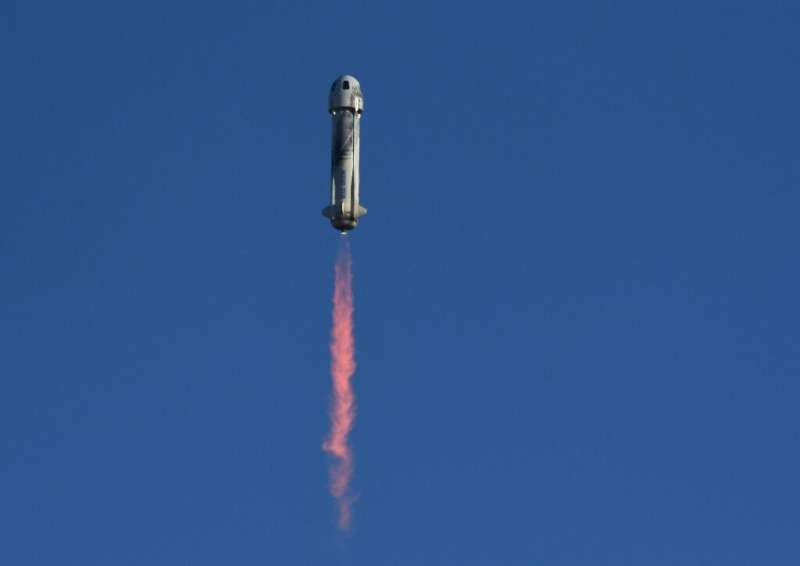
Copernical Team
Blue Origin sends first Egyptian and Portugese nationals to space

Jeff Bezos' Blue Origin on Thursday launched six people to space, including the first from Egypt and Portugal, on the company's sixth crewed flight.
Mission "N-22" saw the New Shepard suborbital rocket blast off around 8:58 am local time (1358 GMT) from Blue's base in the west Texas desert.
The autonomous, re-usable vehicle sent its crew capsule soaring above the Karman line, the internationally recognized space boundary, 62 miles (100 kilometers) above sea level.
"I'm floating!" a crew mate could be heard saying on a livestream, as the capsule coasted to its highest point and the passengers experienced a few minutes of weightlessness.
Both the rocket and capsule separately returned to the base—the latter using giant parachutes—completing the mission around 11 minutes after lift-off.
The final frontier? Just a slice of Spanish sausage

A red ball of spicy fire with luminous patches glowing menacingly against a black background.
This, prominent French scientist Etienne Klein declared, was the latest astonishing picture taken by the James Webb Space Telescope of Proxima Centauri, the closest star to our Sun.
Fellow Twitter users marveled at the details on the picture purportedly taken by the telescope, which has thrilled the world with images of distant galaxies going back to the birth of the universe.
"This level of detail... A new world is revealed every day," he gushed.
But in fact, as Klein later revealed, the picture was not of the intriguing star just over four light-years from the Sun but a far more modest slice of the lip-sizzling Spanish sausage chorizo.
Photo de Proxima du Centaure, l'étoile la plus proche du Soleil, située à 4,2 année-lumière de nous.
Elle a été prise par le JWST.
Ce niveau de détails… Un nouveau monde se dévoile jour après jour.
ESA testing sensor network for smart city navigation

New infrastructure added to ESA’s ESTEC technical centre in the Netherlands is helping to test how tomorrow’s smart cities will operate in practice. The HANSEL system is hosted in ESTEC’s Navigation Laboratory and allows linking to sensors across the site, providing insight into the collective networking and computing needed to get a variety of ‘intelligent elements’ to mesh seamlessly together – what the brain of a future smart city might look like.
The strength of the strong force
 Much ado was made about the Higgs boson when this elusive particle was discovered in 2012. Though it was touted as giving ordinary matter mass, interactions with the Higgs field only generate about 1 percent of ordinary mass. The other 99 percent comes from phenomena associated with the strong force, the fundamental force that binds smaller particles called quarks into larger particles called pr
Much ado was made about the Higgs boson when this elusive particle was discovered in 2012. Though it was touted as giving ordinary matter mass, interactions with the Higgs field only generate about 1 percent of ordinary mass. The other 99 percent comes from phenomena associated with the strong force, the fundamental force that binds smaller particles called quarks into larger particles called pr Through the Pass We Go Sols 3551-3552
 Curiosity is making its way through the stunning "Paraitepuy Pass," the little canyon that runs between the "Deepdale" and "Bolivar" buttes to our east and west, respectively. The canyon floor is filled with aeolian bedforms, or sand ripples, as wind is likely funneled through the pass, mobilizing sand grains - a lovely modern process, active on Mars today! Today's two-sol plan contains our norm
Curiosity is making its way through the stunning "Paraitepuy Pass," the little canyon that runs between the "Deepdale" and "Bolivar" buttes to our east and west, respectively. The canyon floor is filled with aeolian bedforms, or sand ripples, as wind is likely funneled through the pass, mobilizing sand grains - a lovely modern process, active on Mars today! Today's two-sol plan contains our norm NASA team troubleshoots asteroid-bound Lucy across the solar system
 Following the successful launch of NASA's Lucy spacecraft on Oct. 16, 2021, a group of engineers huddled around a long conference table in Titusville, Florida. Lucy was mere hours into its 12-year flight, but an unexpected challenge had surfaced for the first-ever Trojan asteroids mission.
Data indicated that one of Lucy's solar arrays powering the spacecraft's systems - designed to unfurl
Following the successful launch of NASA's Lucy spacecraft on Oct. 16, 2021, a group of engineers huddled around a long conference table in Titusville, Florida. Lucy was mere hours into its 12-year flight, but an unexpected challenge had surfaced for the first-ever Trojan asteroids mission.
Data indicated that one of Lucy's solar arrays powering the spacecraft's systems - designed to unfurl Virgin Galactic secures land for new astronaut campus and training facility
 Virgin Galactic Holdings, Inc. (NYSE: SPCE) has secured land to move forward with a new astronaut campus and training facility in the State of New Mexico, near the Company's commercial operations headquarters.
The land, located in Sierra County, will be home to a new, first of its kind astronaut campus, for exclusive use by Virgin Galactic Future Astronauts and up to three of their guests
Virgin Galactic Holdings, Inc. (NYSE: SPCE) has secured land to move forward with a new astronaut campus and training facility in the State of New Mexico, near the Company's commercial operations headquarters.
The land, located in Sierra County, will be home to a new, first of its kind astronaut campus, for exclusive use by Virgin Galactic Future Astronauts and up to three of their guests Major new investment accelerates construction of the Giant Magellan Telescope
 The Giant Magellan Telescope, the most powerful telescope ever engineered using the world's largest mirrors, today announced it has secured a $205 million investment from its international consortium to accelerate construction. This investment marks one of the largest funding rounds for the telescope since its founding and includes leading commitments from the Carnegie Institution for Science, H
The Giant Magellan Telescope, the most powerful telescope ever engineered using the world's largest mirrors, today announced it has secured a $205 million investment from its international consortium to accelerate construction. This investment marks one of the largest funding rounds for the telescope since its founding and includes leading commitments from the Carnegie Institution for Science, H 'We're going;' NASA says its ready for Artemis I unmanned trip to moon
 Sounding like an excited new parent, NASA Administrator Bill Nelson declared during a press briefing Wednesday that the agency's Artemis mission is ready to take its first physical steps to return to the moon and sometime later head to Mars.
Laying out an effort that will include international and commercial partners, Nelson said Artemis I will take off for months-long orbiting around t
Sounding like an excited new parent, NASA Administrator Bill Nelson declared during a press briefing Wednesday that the agency's Artemis mission is ready to take its first physical steps to return to the moon and sometime later head to Mars.
Laying out an effort that will include international and commercial partners, Nelson said Artemis I will take off for months-long orbiting around t NASA's mineral dust detector on ISS starts gathering data with EMIT
 Newly installed on the space station, the instrument, called EMIT, will help answer questions about how mineral dust from Earth's arid regions affects climate.
After being installed on the exterior of the International Space Station, NASA's Earth Surface Mineral Dust Source Investigation (EMIT) mission has provided its first view of Earth. The milestone, called "first light," took place at
Newly installed on the space station, the instrument, called EMIT, will help answer questions about how mineral dust from Earth's arid regions affects climate.
After being installed on the exterior of the International Space Station, NASA's Earth Surface Mineral Dust Source Investigation (EMIT) mission has provided its first view of Earth. The milestone, called "first light," took place at 



































